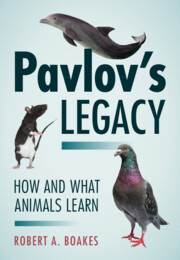Book contents
- Pavlov’s Legacy
- Pavlov’s Legacy
- Copyright page
- Contents
- Preface
- Acknowledgments
- 1 Ivan Pavlov, Conditioned Reflexes and Experimental Neuroses
- 2 Developing Habits
- 3 Learning Where Things Are and Where Events Happen
- 4 Fear, Avoidance, and Punishment
- 5 Comparative Psychology
- 6 Imprinting and Constraints on Learning
- 7 Discrimination Learning, Attention and Stimulus Generalization
- 8 B.F. Skinner and the Experimental Analysis of Behavior
- 9 How Animals Learn to Associate Events
- Notes
- References
- Index
5 - Comparative Psychology
Species Differences in What Animals Can Learn?
Published online by Cambridge University Press: 07 October 2023
- Pavlov’s Legacy
- Pavlov’s Legacy
- Copyright page
- Contents
- Preface
- Acknowledgments
- 1 Ivan Pavlov, Conditioned Reflexes and Experimental Neuroses
- 2 Developing Habits
- 3 Learning Where Things Are and Where Events Happen
- 4 Fear, Avoidance, and Punishment
- 5 Comparative Psychology
- 6 Imprinting and Constraints on Learning
- 7 Discrimination Learning, Attention and Stimulus Generalization
- 8 B.F. Skinner and the Experimental Analysis of Behavior
- 9 How Animals Learn to Associate Events
- Notes
- References
- Index
Summary
This chapter describes research in comparative psychology. Many of these studies aimed to show that species differ in their learning and problem-solving abilities. The chapter starts with studies that attempted to teach a language to chimpanzees and examined their apparently remarkable ability to learn by imitation. The chapter then describes studies of complex learning in monkeys, focusing on the work of Harlow, before moving on to dolphins. The attempt by Bitterman to demonstrate differences between rat-like and fish-like learning abilities is followed by an account of experiments that used matching-to-sample tasks in pigeons and compared the learning abilities of corvids with those of pigeons.
Keywords
- Type
- Chapter
- Information
- Pavlov's LegacyHow and What Animals Learn, pp. 103 - 146Publisher: Cambridge University PressPrint publication year: 2023

